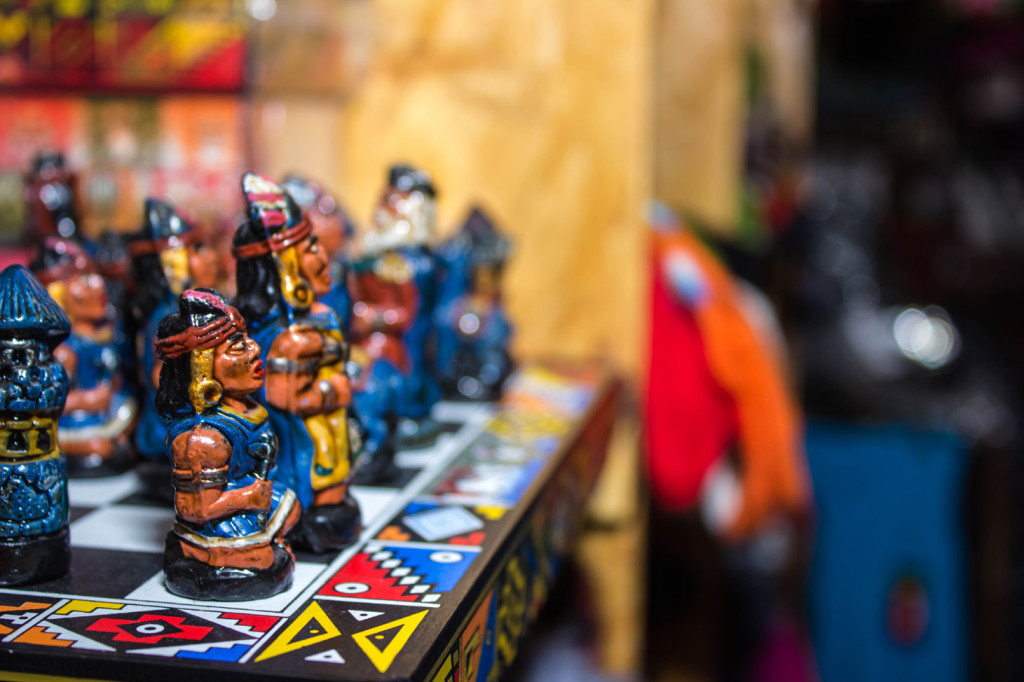Paititi art reveals hidden treasures
by Stephanie Marcone
Paititi is legendary.
According to ancient lore, deep in the rainforests of southeast Peru is a lost Incan city undiscovered by the Spanish that and allegedly the site of buried gold.
This cultural epic infuses Murray Avenue’s Paititi Art and Hand Crafts with a similar mystique. The shop is a cornucopia of Peruviuan fair-trade items rare of Pittsburgh, which makes it Squirrel Hill’s own clandestine collection of curios.
Owner Cessy Portuguez’s eyes brighten when she talks about the origin of the store’s name.
“When the conquistadors came to South America, the people didn’t want to give everything away. Between the mountains and the jungle was a secret place to hide the treasures.” Similarly, she says, “The store’s small, nobody knows about it – but should know.”
Paititi’s mission is to support fair trade and help Peruvian artisans find recognition. Every single item in Paititi is made in Peru.
Fair trade, in fact, is an American name for a practice that’s expected among the population of Peruvian workers.
“Here, it’s called fair-trade but in Peru it’s working in communities. Every family makes something and we all help each other,” she says.
The Portuguez family makes alpaca sweaters, and it’s such a far-reaching tradition that Cessy doesn’t even know when it began. Her family has three stores – all named El Sol – in different parts of Peru.

Knick-knacks and silken scarves line the walls of Paititi, waiting for customers to bring them home.
Photo by Mike Lynch
“My great-grandparents opened El Sol, they started the business and we continued,” Portuguez said.
The American branch of the Portuguez legacy began in 2009, when Cessy opened Paititi after a trip to visit a friend in Oakland. She enjoyed the company of Pittsburghers, and decided to open a store in nearby Squirrel Hill.
“When I came here the people were so nice. Very polite,” she says. She thinks for a minute. “Friendly, that’s the right word. I like that we can talk.”
On warm days, bright colored scarves and sweaters hanging on the open Paititi door greet passersby on the Murray Avenue sidewalk. Inside, customers will find a new culture filled with intriguing items
The shop houses everything from pan flutes, animals made of seashells and hand-painted leather bags to woven headbands with tiny people holding hands stitched across the border. The abundance of gifts in the small storefront provides an opportunity for patrons to explore Peru without having to take a vacation.
Cessy stands behind her glass countertop sorting price tags for her inventory. She is wearing a vivid purple alpaca sweater with red, green, yellow and pink designs. Her highlighted brown hair is pulled back, revealing a dangling pair of seashell earrings. Alpaca and jewelry, in fact, are two of the mainstays of the store.
Hats, earmuffs, gloves, jackets, scarves and sweaters — all alpaca — are probably the most popular items. There are even fuzzy fleece alpaca dolls of all sizes. And if you’d like to know more about alpacas, one of the price tags will be happy to oblige you.
“The alpaca is a beautiful animal which inhabits the plateaus of the South American Andes, at altitudes as high as 4500 meters above sea level and with temperatures dropping to minus 30°C, which accounts for its developing a fine hair of thermal features, lustrous texture and in an ample variety of natural shades,” one such tag reads. “These ruminants, distant cousins to the camel, have established since a long time, Peru’s rich traditions in textiles.” In other words: perfect for a long Pittsburgh winter.
Carved stone pieces such as spirit animals, elephant figurines and pyramids with nativity scenes inside fill the glass display cases. Other displays showcase a seemingly endless amount of jewels made with Peruvian minerals, stones and other organic materials, including pieces made of serpentine, chrysolla, jasper, quartz, turquoise and malachite.
South American cultures often use seeds when making jewelry. Huayruros and tagua nuts from ivory palms are a few seeds that appear in the store’s jewelry. “Palmito,” or straw, is another popular Peruvian textile used in jewelry making.
Cessy herself makes a lot of the Paititi jewelry. She explains some pieces take her longer than others. For example: the intricately woven necklace with a stone pendant she held up took her about two weeks to make.
Customers cherish the unique shop. On Yelp, Larissa G. of Pittsburgh gave the store its lowest rating (a 4 out of 5) and praised its unparalleled assortment of knick-knacks.
“Small or not, the items in here are adorable. Dresses, skirts, shorts, jewelry, scarves- all with that fantastic handmade feel to them that department store items just don’t have. And everything in here is just so fun- there are bright colors, patterns and beads on almost all of the clothes,” Larissa wrote.
Cessy admits that owning a business is “so hard” at times, but it’s her customers and artisans that keep her committed. With her dedication, Paititi can continue to share a slice of Peru with the Squirrel Hill community.
 Previous Post
Previous Post Next Post
Next Post